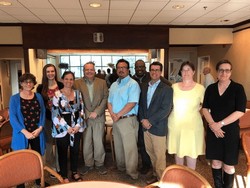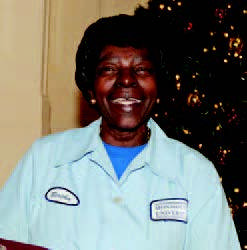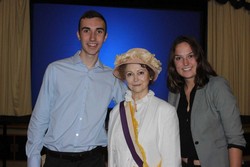The University held its first World Ethics Café where students were invited to deliberate on ethical issues in the Magill Club Dining Hall on April 10.
Faculty facilitated ethical discussions with students in seven rotating sessions, each focusing on a different ethical dilemma.
Students were asked to consider questions like “Is it ethical to clone humans?” and “Is fair trade really fair?” Students also weighed in on whether it is right to pay CEOs 300 times the median pay of workers, or if the death penalty should be abolished.
The event was funded by the Helen McMurray Bennett Endowment in Social Ethics and was co-sponsored by the Honors School. Johanna Foster, Ph.D., the Helen McMurray Bennett Endowed Chair of Social Ethics and an associate professor of sociology, organized the event.
Others who were instrumental in organizing the event were: Claude Taylor, the University’s Advisor-in-Residence for Academic Transition and Inclusion and a lecturer of communication; Heide Estes, Ph.D., a professor of English; Manuel Chavez, Ph.D., a lecturer of World Languages and Cultures; Scott Jeffrey, Ph.D., an associate professor of business; Kevin Dooley, Ph.D., an associate professor of political science; Catherine Duckett, Ph.D., Associate Dean of the School of Science; and Nancy Mezey, Ph.D., Dean of the Honors School.
A group of professors called Murder of Ethicists, recently established to work to elevate the campus conversation on social ethics, and to raise greater awareness about the wide range of threats to shared values of ethics, also worked to organize the event.
“This event was a huge success,” said Mezey. “It not only raised awareness about a variety of specific ethical issues, but also reminded us how important it is for us to come together to discuss and debate such issues so that we can become more informed people.”
The World Ethics Café provided students with a safe space to engage in conversation about challenging issues. “There were no right or wrong answers at any of cafeteria tables and all were encouraged to examine the issues from many sides, and to entertain positions one might not usually consider,” Foster said.
Discussing these issues presented students with a variety of perspectives. Brittany Macaluso, a sophomore social work student, said, “Opening [this event] up to the students and having professors speak about prevalent topics not only informs students but provides new insight. It is an opportunity to learn more about social justice issues.”
Mezey, who facilitated a table discussing the ethics of cloning, said, “Many of the ethical questions posed had so many possible answers, so students could explore the questions in a variety of ways and develop their own conclusions around what is ethical and what is not.”
The goal of the event was to encourage students to examine “what it means to ‘do the right thing’ and consider what kinds of social systems we need to promote the common good,” Foster explained.
“The result was energetic and engaged discussions where we were all both educators and learners,” said Mezey.”
Foster concluded, “We are all responsible for doing the hard work of collectively defining and protecting our shared understandings of the common good, and for constantly examining whether those principles are being put into action and how and those deliberations should be at the core of what we do at a university.”
PHOTO COURTESY of Monmouht University



